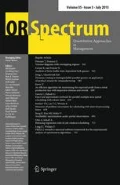Abstract
This paper investigates dynamic and strategic (oligopolistic) interactions with respect to their corporate social responsibility (CSR) activities. In order to separate dynamic from strategic effects, the paper proposes a differential game and derives the open loop and Markov perfect Nash equlibria with the cooperative solution as benchmark. The Markov strategies are in stark contrast to the open loop equilibrium that is close to cooperation. This suggests that strategic aspects are indeed crucial. This rat race, once triggered, can explain fast and wide growth of CSR and not necessarily underlying overall efficiency considerations.





Similar content being viewed by others
Notes
Another example that managers may promise too much is Mike Sears, (former) chief financial officer of Boeing. He writes in his book “Soaring Through Turbulence: A New Model for Managers Who Want to Succeed in a Changing Business World ” (coauthored by Thomas Schweich but then withdrawn): “either you are ethical or you are not. You have to make that decision; all of us do. And there is no in-between”. Mike Sears was fired from his job as chief financial officer of Boeing for misconduct, i.e., an affair with Darleen Druyun, who later joined Boeing’s missile division.
The major criterion for the parameter values was to satisfy all assumptions and to allow for feasible and sensible interior solutions, e.g. at least some CSR also in the efficient solution. Thus no further meaning except for differences and qualitative features should be attached to the numbers.
References
Baron DP (2007) Corporate Social Responsibility and Social Entrepreneurship. J Econ Manag Strategy 16:683–717
Baron DP (2008) Managerial contracting and corporate social responsibility. J Public Econ 92:268–288
Baron DP (2010) Morally Motivated Self-Regulation. Am Econ Rev 100:1299–1329
Becchetti L, Giallonardo L, Tessitore ME (2010) A CSR Product Differentiation Model with Asymmetric Information. Rivista Italiana degli Economisti 15:209–236
Becchetti L, Solferino N (2005) The Dynamics of Ethical Product Differentiation and the Habit Formation of Socially Responsible Consumers. Working Paper.
Brammer S, Millington A (2008) Does it pay to be different? An Analysis of the Relationship between Corporate Social and Financial Performance. Strategic Manag J 29:1325–1343
Cespa G, Cestone G (2007) Corporate social responsibility and managerial entrenchment. J Econ Manag Strategy 16:741–771
Chatterji AK, Levine DI, Toffel MW (2009) How well do social ratings actually measure corporate social responsibility. J Econ Manag Strategy 18:125–169
Dockner EJ, Jorgensen S, van Long N, Gerhard S (2000) Differential Games in Economics and Management Science. Cambridge University Press, Cambridge
Dockner EJ, van Long N (1993) International Pollution Control: Cooperative versus Non-Cooperative Strategies. J Environ Econ Manag 25:13–29
Drake MJ, Gerde VW, Wasieleski DM (2011) Socially responsible modeling: a stakeholder approach to the implementation of ethical modeling in operations research. OR Spectrum 33:1–26
Fernández-Kranz D, Santaló J (2010) When necessity becomes a virtue: the effect of product market competition on corporate social responsibility. J Econ Manag Strategy 19:453–487
Freeman R (1984) Strategic Management: a Stakeholder Approach. Pitman.
Goering GE (2010) Corporate Social Responsibility, Durable-Goods and Firm Profitability. Manag Decis Econ 31:489–496
Goyal A (2006) Corporate Social Responsibility as a Signalling Device for Foreign Direct Investment. Int J Econ Bus 13:145–163
Grolleau G, Mzoughi N, Pekovic S (2012) Green not (only) for profit: An empirical examination of the effect of environmental-related standards on employees’ recruitment. Resour Energy Econ 34:74–92
He X, Prasad A, Sethi SP, Gutierrez GJ (2007) A Survey of Stackelberg Differential Game Models in Supply and Marketing Channels. J Sys Sci Sys Eng 16(4):385–413
Hillman AJ, Keim GD (2001) Shareholder Value, Stakeholder Management, and Social Issues: What’s the Bottom Line. Strategic Manag J 22(2):125–139
Jørgensen S, Guiomar M-H, Georges Z (2010) Dynamic Games in the Economics and Management of Pollution. Environ Model Assess 15:433–467
Kopel M (2009) Strategic CSR, Spillovers, and First-Mover Advantage. http://papers.ssrn.com/sol3/papers.cfm?abstract_id=1408632
Kopel M, Brand B (2011) Socially Responsible Firms and Endogenous Choice of Strategic Incentives. http://papers.ssrn.com/sol3/papers.cfm?abstract_id=1809816
Lambertini L, Tampieri A (2011) On the Stability of Mixed Oligopoly Equilibria with CSR Firms, Qaderni Working Paper DSE #768, Universitá di Bolgna.
Lundgren T (2011) A Microeconomic Model of Corporate Social Responsibility. Metroeconomica 62:69–95
McWilliams A, Siegel D (2000) Corporate Social Responsibility and Financial Performance: Correlation or Misspecification. Strategic Manag J 21:603–609
Mintzberg H (1983) The Case for Corporate Social Responsibility. J Buss Strategy 4(2):3–15
Palmer K, Oates WE, Paul RP (1995) Tightening Environmental Standards: The Benefit-Cost or the No-Cost Paradigm? J Econ Perspectives 9(4):119–132
Parmer BL, Freeman RE, Harrison JS, Wicks AC, Purnell L, de Colle S (2010) Stakeholder Theory: The State of the Art. Acad Manag Annals 4(1):403–445
Porter ME, van der Linde C (1995a) Green and competitive: ending the stalemate. Harvard Business Review, pp 120–134.
Porter ME, van der Linde C (1995b) Toward a new conception of the environment-competitiveness relationship. J Econ Perspectives 9:97–118
Porter ME, Kramer MR (2006) Strategy and Society, Haruard Business, Review, pp 78–92.
Porter ME, Kramer MR (2011) Creating shared value, Haruard Business, Review, pp 62–77.
Rowat C (2006) Nonlinear strategies in a linear quadratic differential game. J Econ Dyn Control 31:3179–3202
Reinhardt FL, Stavins RN, Vietor RHK (2008) Corporate Social Responsibility Through an Economic Lens. Review of Environmental Economics and Policy 1:1–22
Siegel DS, Vitaliano DF (2007) An empirical analysis of the strategic use of corporate social responsibility. J Econ Manag Strategy 16:773–792
Surroca J, Tribo JA, Waddock S (2010) Corporate Responsibility and Financial Performance: The Role of Intangible Resources. Strategic Manag J 31:463–490
Tsutsui S, Mino K (1990) Nonlinear Strategies in Dynamic Duopolistic Competition with Sticky Prices. J Econ Theory 52:136–161
Vives X (2005) Complementarities and Games: New Developments. J Econ Literature XLIII: 437–479.
Wirl F (2007) Do Multiple Nash Equilibria in Markov Strategies Mitigate the Tragedy of the Commons? J Econ Dyn Control 31:3723–3740.
Wirl F, Jürgen N (2007) Voluntary (Environmental) Standards. J Econo Bus 59:275–285
Author information
Authors and Affiliations
Corresponding author
Additional information
I gratefully acknowledge the very helpful comments from three anonymous referees.
Rights and permissions
About this article
Cite this article
Wirl, F. Dynamic corporate social responsibility (CSR) strategies in oligopoly. OR Spectrum 36, 229–250 (2014). https://doi.org/10.1007/s00291-013-0319-6
Published:
Issue Date:
DOI: https://doi.org/10.1007/s00291-013-0319-6




